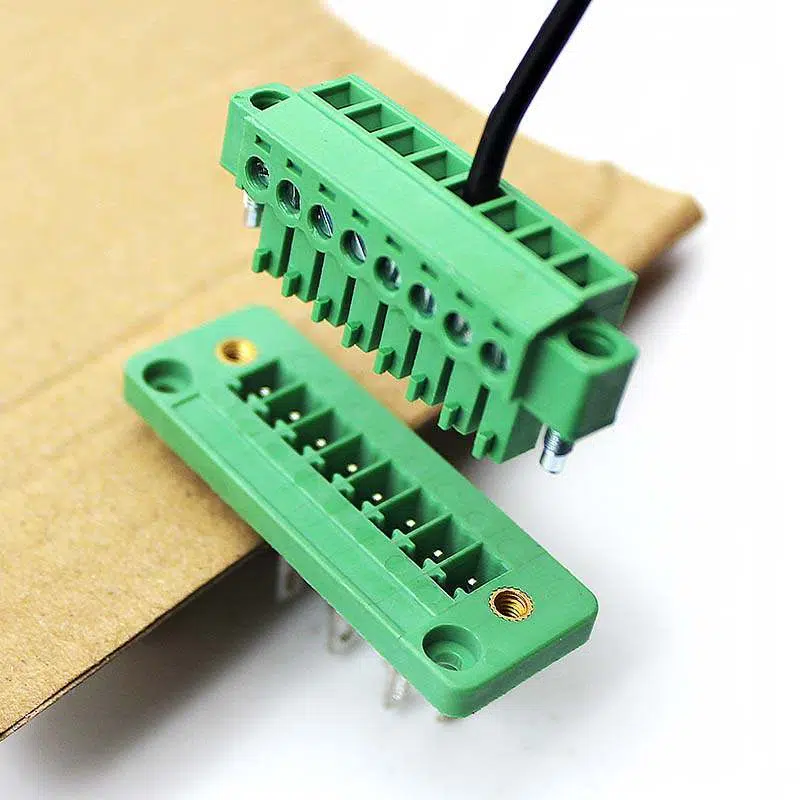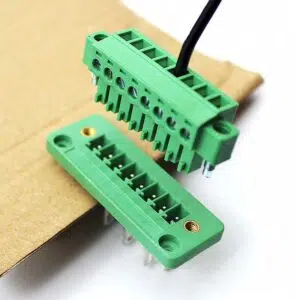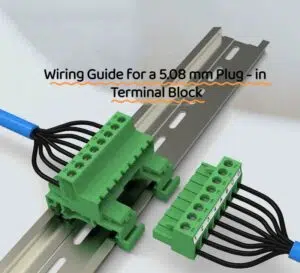The electrical industry is shifting from soldered connections to pluggable terminal block male and female systems, driven by modularity demands. These connectors enhance maintenance efficiency, reduce wiring errors, and lower long-term costs compared to traditional methods. A male pluggable terminal block features pins for insertion, while the female counterpart has sockets for secure mating.
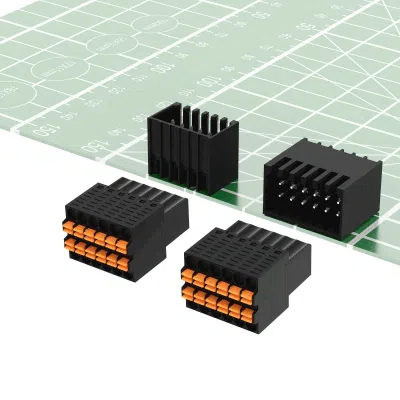
This design ensures quick, tool-free connections and reliable performance in industrial, energy, and consumer applications. By adopting pluggable terminals, engineers gain flexibility, scalability, and faster troubleshooting—making them essential in modern electrical systems.
Part 1 Technical Architecture & Operational Mechanism
Male& Female
Our pluggable terminal block male connectors feature gold/tin-plated brass contacts for superior conductivity and corrosion protection. Designed with straight or right-angle pins, they securely lock in place for vibration-proof connections. The matching female terminal blocks use phosphor bronze spring contacts that maintain constant pressure for optimal conductivity. Smart polarization and keyed designs prevent incorrect mating – no more connection mistakes. Engineered for industrial applications, these rugged male and female pluggable terminal blocks deliver dependable performance in control systems, power distribution, and automation equipment, even in challenging environments.
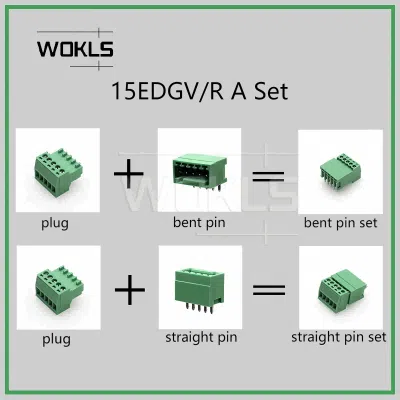
Smart polarization and keyed designs prevent incorrect mating – no more connection mistakes. Engineered for industrial applications, these rugged male and female pluggable terminal blocks deliver dependable performance in control systems, power distribution, and automation equipment, even in challenging environments.
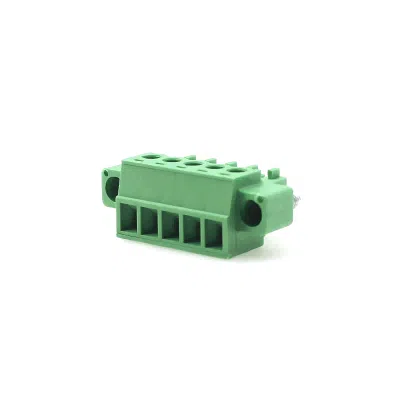
Technical Specifications and Performance Advantages
Modern pluggable terminal blocks are engineered to meet rigorous industry standards, typically rated for 10A/300V operation with UL certification ensuring safety compliance across various applications. Through comprehensive comparative testing, these innovative connectors demonstrate superior electrical performance, maintaining consistent contact resistance in the range of 2-5mΩ – significantly lower than traditional crimp-type connections which typically measure 5-10mΩ. This enhanced conductivity stems from their precision-engineered contact pressure design that remains stable throughout the product lifecycle. The pluggable interface offers remarkable long-term reliability, maintaining stable resistance values even after thousands of mating cycles. In contrast, conventional crimped connections often exhibit gradual performance degradation when subjected to vibration or thermal cycling in demanding industrial environments. These technical advantages make pluggable terminal blocks particularly valuable for mission-critical applications requiring dependable, maintenance-free connections, such as:
- Industrial automation control systems
- Process monitoring equipment
- Power distribution units
- Machine safety circuits
The combination of lower contact resistance, vibration resistance, and long-term stability explains why many European and North American engineers now specify pluggable terminal blocks for applications where connection integrity cannot be compromised.
Ergonomic Design and Secure Locking Mechanisms
Pluggable terminal blocks incorporate carefully engineered insertion/extraction force profiles, typically requiring 20-40 Newtons for mating and 30-60 Newtons for disconnection. These optimized force curves achieve the perfect balance between secure electrical contact and user-friendly operation. Manufacturers offer two distinct locking solutions to accommodate different industrial needs: 1.Tool-Free Thumb Releases (Phoenix Classic style):
- Enable rapid connection and disconnection
- Ideal for applications requiring frequent maintenance
- Reduce service time by up to 70% compared to traditional methods
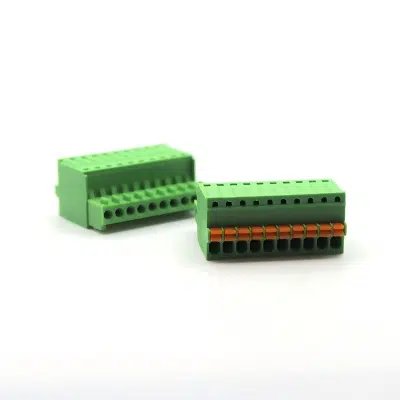
2.High-Performance Screw-Lock Designs:
- Provide exceptional vibration resistance (exceeding 10G acceleration)
- Maintain connection integrity in harsh environments
- Preferred for transportation and heavy machinery applications
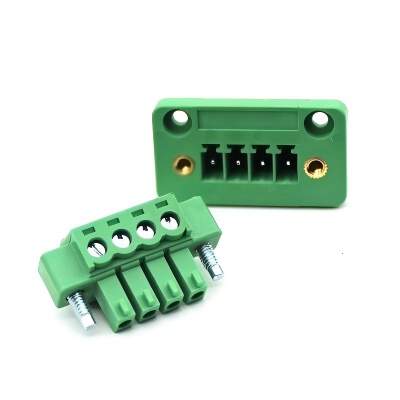
The thumb-release mechanism prioritizes accessibility and speed, while the screw-lock version delivers maximum reliability under dynamic conditions. These differentiated solutions allow engineers to select the optimal configuration based on specific application requirements, whether prioritizing serviceability in control panels or ruggedness in mobile equipment. The consistent force curves ensure proper mating while preventing accidental disconnection, making pluggable terminal blocks suitable for both standard industrial use and mission-critical applications.
Part 2 Critical Key Application Scenarios
Industrial Automation Applications
In industrial automation systems like PLC module expansions – where frequent I/O module changes are required – pluggable terminal blocks offer significant maintenance advantages. The key selection criteria focus on:
- IP protection ratings (IP67 being standard for dust/water resistance)
- Vibration-resistant locking mechanisms
- Quick-disconnect capabilities
Energy Systems
Solar PV junction boxes utilize polarized pluggable terminal blocks with gender-specific male/female connectors to prevent DC polarity reversal – a critical safety feature in photovoltaic applications. These components are manufactured using high-temperature thermoplastics and metal alloys capable of withstanding continuous operation above 105°C, addressing the thermal challenges of rooftop installations. The combination of:
- Foolproof polarized mating interfaces
- UV-resistant housing materials
- Thermally-stable contact metals
- >25kV dielectric strength
ensures reliable performance throughout the system’s operational lifespan while maintaining safety standards in high-voltage DC environments.
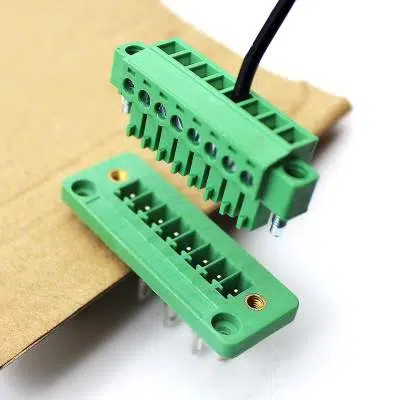
Consumer Electronics
Consumer electronics face competing demands: shrinking device dimensions versus maintaining electrical reliability. Miniature pluggable terminal blocks with 2.54mm pitch address this dilemma by offering:
- Space-saving compact designs
- Maintained contact reliability through precision engineering
- Vibration-resistant micro-locking mechanisms
- PCB real estate constraints
- Assembly automation compatibility
- Field service requirements
Part 3 Pluggable vs. Traditional Terminal Blocks
Pluggable terminal blocks excel in speed and modularity, enabling tool-free installations and simplified maintenance. While traditional screw terminals retain cost advantages, modern pluggable designs now match their vibration resistance-making them the preferred choice for most industrial applications today. Pluggable terminal blocks offer distinct advantages over conventional screw/weld connections:
|
Pluggable |
Traditional Terminal Blocks |
|
|
Installation Speed |
Seconds per connection(tool-free) |
Minutes per connection(tools required) |
|
Maintenance |
Module-level replacement |
Component-level rework |
|
Reliability |
Consistent contact pressure |
Potential for loose connections |
|
Cost Structure |
Higher unit cost; Lower labor |
Lower unit cost; Higher labor |
|
Additional Considerations |
Better for modular systems; Reduced installation errors |
Superior in high-vibration environments; Simpler field repairs |
Conclusion
In today’s demanding industrial environments, pluggable terminal blocks deliver the perfect balance of reliability, efficiency, and versatility. Whether you’re engineering new automation systems or modernizing existing infrastructure, AOSI offers premium UL-certified connectors designed for peak performance—all available directly from our manufacturing facilities. Our 2025 collection introduces cutting-edge features like vibration-resistant locking systems and enhanced current ratings, supported by:
- On-demand technical expertise
- Rapid global logistics
- Custom OEM configurations

